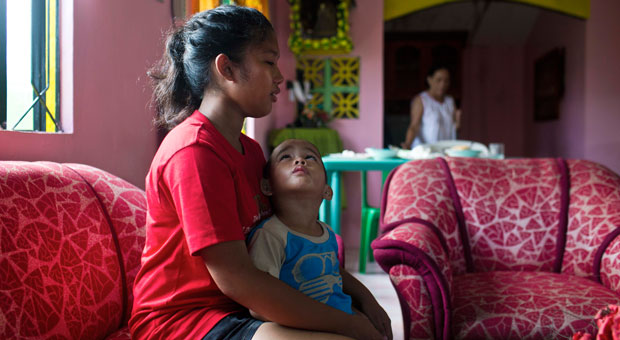Tax perk for adopting orphans pushed

In this Nov. 21, 2013, photo, Shylyny Therese Negru, 15, holds her youngest brother, Rainier Aaron Dacuno, 3, as they sit in a relative’s home in the town of Burauen, Leyte. House Bill No. 4931 has been filed granting P100,000 additional tax deduction every year for an adopter of an orphan or a foundling. AP FILE PHOTO
MANILA, Philippines–Adopt an orphan or a foundling and get P100,000 in additional tax deductions every year.
This was proposed by the party-list group A Teacher (Advocacy for Teacher Empowerment through Action, Cooperation and Harmony towards Educational Reforms Inc.), in House Bill No. 4931 filed by its Representatives Mariano U. Piamonte Jr. and Julieta R. Cortuna.
The tax deduction of P100,000 would be given on top of the existing tax exemptions provided by the Bureau of Internal Revenue (BIR) under the National Internal Revenue Code. Under the code, the designated head of the family is entitled to a P50,000 tax deduction for each dependent (up to a maximum of four), including legally adopted children.
While the party-list representatives contended that pushing for additional tax perks would encourage more couples or individuals to take in and care for orphans and abandoned children, BIR Commissioner Kim Henares quickly shot down the proposal, and not only because of its adverse impact on revenue collections.
“I thought adopting children should be out of our own generosity or compassion and not because of tax deductions,” Henares said during a break in the congressional debates on the 2015 national budget.
Article continues after this advertisementIn a statement, Cortuna said the state was already spending for the care of these children through state-run orphanages and “allowing couples to do the government’s job will reduce expenditures.”
Article continues after this advertisementBill coauthor Piamonte said that encouraging people to adopt orphans would ensure that these children would “get parental guidance and ensure that they would become good citizens.”
He added: “If the state will not exhaust all means to provide abandoned children or orphans the right environment (in which) to grow, they will likely become a liability… rather than an asset.”
The bill covers children up to 15 years who have been abandoned by their parents; those who lost their parents and have no relatives to take care of them; and those whose parents have been declared by the court or medical experts as being mentally incapable of raising a child.